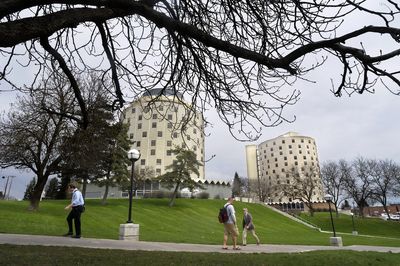Dems’ budget slashes education, social services, health care

OLYMPIA – After days of last-minute, late-night negotiations, Democratic budget writers in Olympia agreed Wednesday on a state budget with about $4 billion in cuts to schools, higher education, social services, health care and other state services.
Lawmakers, facing a $9 billion budget shortfall, avoided much deeper cuts by tapping more than $3 billion in federal stimulus money, delaying pension payments, and agreeing to increase college tuition.
“Out of a very tough budget, we made very rational decisions that will move Washington forward,” said state Sen. Rodney Tom, D-Medina. Negotiators worked until 2 a.m. Wednesday, and lawmakers expect to work through the weekend before adjourning as planned on Sunday night.
Tom and other budget writers declined to release specifics until they’d briefed their fellow lawmakers. But he said the public will feel the cuts.
“I think everyone in Washington will be affected,” he said. Schools programs will shrink, he said. Middle-class families will find it more expensive to put their kids through college – if they can get into the classes at all. It will be harder for low-income families to get state-subsidized health coverage.
The budget does not include a state income tax or a three-tenths of a cent sales tax increase. Lawmakers have floated both ideas – which would need voter approval – to offset hundreds of millions of dollars in cuts.
The income tax proposal now seems unlikely, and the sales tax plan appears to be faltering. Recent polling showed that voters were lukewarm on increasing taxes, even for hospitals, nursing homes and other health services.
Rep. Kelli Linville, the top House budget writer, said key priorities include protecting colleges, schools and the social safety net.
“Everything took cuts, but our priorities are still intact,” said Linville, D-Bellingham. “… We did what we had to do.”
Republicans, who are in the minority in Olympia, said Democrats missed a key chance to pare government down to key functions, instead relying heavily on a federal bailout and other one-time funding.
“I’m really disappointed,” said Rep. Joe Schmick, R-Colfax. “My priorities were real simple: education, public safety and then helping those who need help. And if it didn’t fall into one of those three categories, then we shouldn’t be doing it.”
He and other Republicans have repeatedly pointed out that state revenues are expected to be slightly higher over the next two years than they are now. By the time the books close in late June, the state is expected to have collected about $30.4 billion for the 2007-’09 budget. Over the next two years, state economists think, that will rise to $30.5 billion.
The $9 billion shortfall is based on what it would have cost to keep state services and programs as-is, including hundreds of millions of dollars in expected cost-of-living increases for workers and teachers and large increases in health care costs. (Those raises were eliminated early in the budget process.) The number also factors in the increased cost of rising numbers of schoolchildren and college students.
Many of the changes in the budget won’t take effect until July 1. But lawmakers say the fallout will be felt widely this summer and fall.
“This goes beyond rattling the local Department of Licensing office door and finding it closed,” said Sen. Chris Marr, D-Spokane. “This will be actually stepping over people sleeping on the sidewalk to get to that door.”
“It’s heart-wrenching,” Senate budget Chairwoman Margarita Prentice, D-Renton, said. “We’re making decisions we never thought we would.”
Linville said she’s worried about future budgets, when billions of federal stimulus dollars presumably won’t be available to cushion the budget again. “That’s why our work isn’t done,” she said.